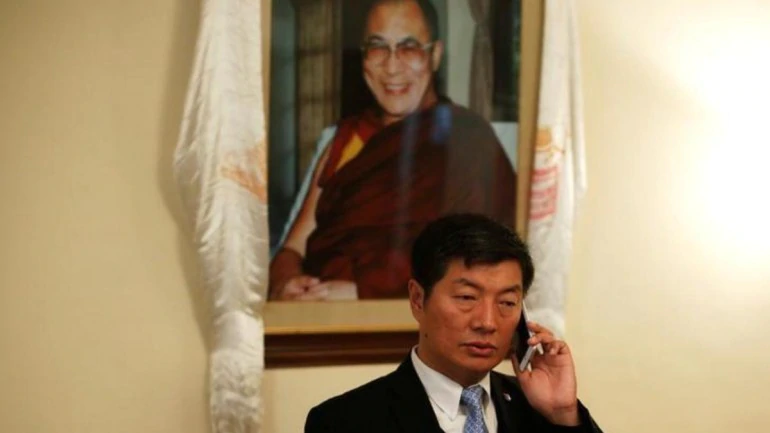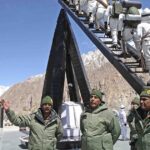
SOURCE : INDIA TODAY
A resolution of the Tibetan issue is the way to peace on the India-China border, says Prime Minister of Tibetan government-in-exile Dr Lobsang Sangay in an exclusive interview with India Today TV. Responding to a question on the call for boycott of Chinese goods, Sangay suggested that celebrities should stop endorsing them, for a start.
India-China standoff
On the latest face-off between India and China, Sangay said: “We have been saying for the last 60 years what happened to Tibet could happen to you to India and all the neighbouring countries of Tibet. Since the occupation of Tibet, China has been trying to expand its influence to the South Asian region as well. Till you resolve this issue of Tibet, border incursions and tensions will remain.”
Asked about the recent aggression and increasing adventurism by Beijing, the PM of Tibetan government-in-exile said, “The recent adventurism is part of an expansionist design. Politically, whenever you [China] have some internal tension or problems, you want the distraction of external problems. You can see from South China Sea to Hong Kong to Taiwan and the 3,488-km border between Tibet and India. After Tibet was occupied, the Chinese leaders, including Mao Tse Tung, have said Tibet is the palm and the five fingers are Ladakh, Sikkim, Nepal, Bhutan and Arunachal”.
“They have taken over the palm and now they are taking over and penetrating into the five fingers. This is what’s happening in Ladakh as well. This is part of their grand old strategy for 60 long years. They are coming under enormous international pressure, given the Wuhan-originated pandemic. Most countries are blaming them, as well as the WHO [World Health Organisation], on the origin of coronavirus from the Chinese city of Wuhan,” he added.
China’s pressure problem
Outlining a picture on dynamics between mainland China and Tibet and the kind of pressure Beijing faces, Dr Sangay said, “When you don’t come through a democratic process, there is an element of insecurity and paranoia. The latest is in Tibet; no-one is allowed to visit Tibetan monasteries. Nuns and monks need local permission even to venture outside their monasteries and state-level permission for travel. Beijing wants absolute control over the Tibetan plateau. The Chinese leadership is in a bit of a jittery mood and hence clamping down on the Tibetan people. This is the holiest month for Tibetans. A few days ago, it was Buddha Purnima. This is the month when monks are allowed to travel, but the Chinese government is applying so much pressure.
The broken promises
On the military build-up along the India-Tibet border, Dr Sangay said: “When the Chinese government promised to build a road connecting China and Tibet, they promised prosperity and stability. But the road was used to bring trucks, guns and tanks to occupy Tibet. Since that time one road has become 100 roads all over the Tibetan plateau, including the border with India”.
“They have built 30 airports, including six military airfields, in neighbouring Arunachal, Ladakh and various places in Tibet. Intercontinental Ballistic Missiles (ICBMs) have been stationed in and around the plateau. All this military build-up has been taking place for 60 years. Even the railway line to Lhasa and coming to the border of Nepal is of high military-grade which can bring heavy equipment,” he added.
He further said, “The entire Tibetan plateau has been militarised. What the Dalai Lama has been saying the permanent solution to this border tension is to make Tibet a zone of peace and demilitarise the borders. History tells us there was not even the need for police to guard the border of India and Tibet. Since it became the India-China border, all these tensions have come up.”
Asked about a realistic political resolution of the Tibet issue, Sangay said, “A colonial power always uses some economic justification to occupy a country… similarly, they are using this economic justification in Tibet as well. But it is baseless. If the Chinese government is so confident that people in Tibet will support them, then, let’s have a referendum. I can say with certainty, a Tibetan leader will win hands down. It’s a fact that 154 Tibetans have committed self-immolation. They are suffering; their repression is so painful. This is what’s going on in Tibet.”
Bill to recognise Tibet
A US lawmaker has moved a bill in the Congress asking for the American president to recognise Tibet as an independent nation. What do you make of it?
“We welcome any kind of support from anybody. But this is more of a symbolic gesture, however, there is a more substantive bill called the Tibetan Policy and Support Act of 2019 which was supported by 95 per cent of the Congress. It shows that support for Tibet in the US and even Europe and many Western countries is very strong. Unless you know the issue of Tibet, you will never fully understand China. This is a lesson for India and for its people to know what China is capable of,” said the PM of Tibetan government-in-exile.
Lesson for India
What lesson India need to learn in the manner China manoeuvred into Tibet?
Sangay explained: “There is a famous document called Simla Convention which was signed in 1914. The India-Pakistan Simla Pact is very well known but Simla Convention between India and Tibet is not as well known. Since 1914, the convention was renewed between Lhasa and Delhi but in 1954, it was renewed between Beijing and India and it came out in the form of Panchsheel. If you look at the agreement, Panchsheel is mentioned only in the Preamble, but the trade route is still from Sikkim to Lhasa. Since Panchsheel, India had to withdraw its representatives as well as a small police-military contingent from Lhasa. Since Panchsheel was signed, disappointment after disappointment came for India, including the 1962 war. India needs to learn a lesson. Trusting the Chinese government fully is not the way to go. You must have a business relationship with China, that’s a fact. But your business should yield you much more.”
Boycott of Chinese products
On the call to boycott Chinese goods, Sangay said if tension is very high, it is for the individual Indian citizen to decide whether your national security is important or buying Chinese products. “You can start with celebrities not endorsing Chinese products.”
“You can control any kind of business from any country. People also have a role to play. Celebrities, when they endorse any brand, including Chinese brand, are doing it for money. You can start from there. When you are doing business with China, you must make money from it. The trade deficit is disproportionately against India. That’s not the way to go,” he added.
The Dalai Lama succession
Asked about the Dalai Lama’s view on the standoff, Sangay said, “In 2011, His Holiness the Dalai Lama renounced political responsibilities and handed over to a democratically elected leader that happens to be me. I speak on his behalf and for all the Tibetan people.”
On being the political successor of Dalai Lama as China may prop up some candidate as the leader of Tibet, he said, “It’s my office that will shoulder the political responsibilities of the Tibetan movement and administration. As far as Beijing is concerned, they already have Tibetan officials in symbolic positions of what they call the Tibet Autonomous Region. More importantly, they don’t have power. They don’t reflect the aspirations and representation of Tibetans.”
Suggestions for India
What are your recommendations to the Indian establishment? “Till the issue of Tibet is not resolved, border incursions will continue. These kinds of issues will keep coming whenever there is internal or international pressure on the Chinese government. Till the border changes from Indo-China back to Indo-Tibet, it will continue. For the security of India, Tibet is very important,” the PM of Tibetan government-in-exile said.
https://defencenewsofindia.com/border-incursions-tensions-will-continue-till-tibet-issue-is-resolved-pm-of-tibetan-govt-in-exile/






